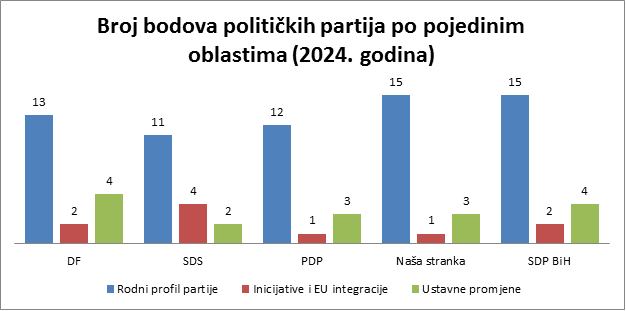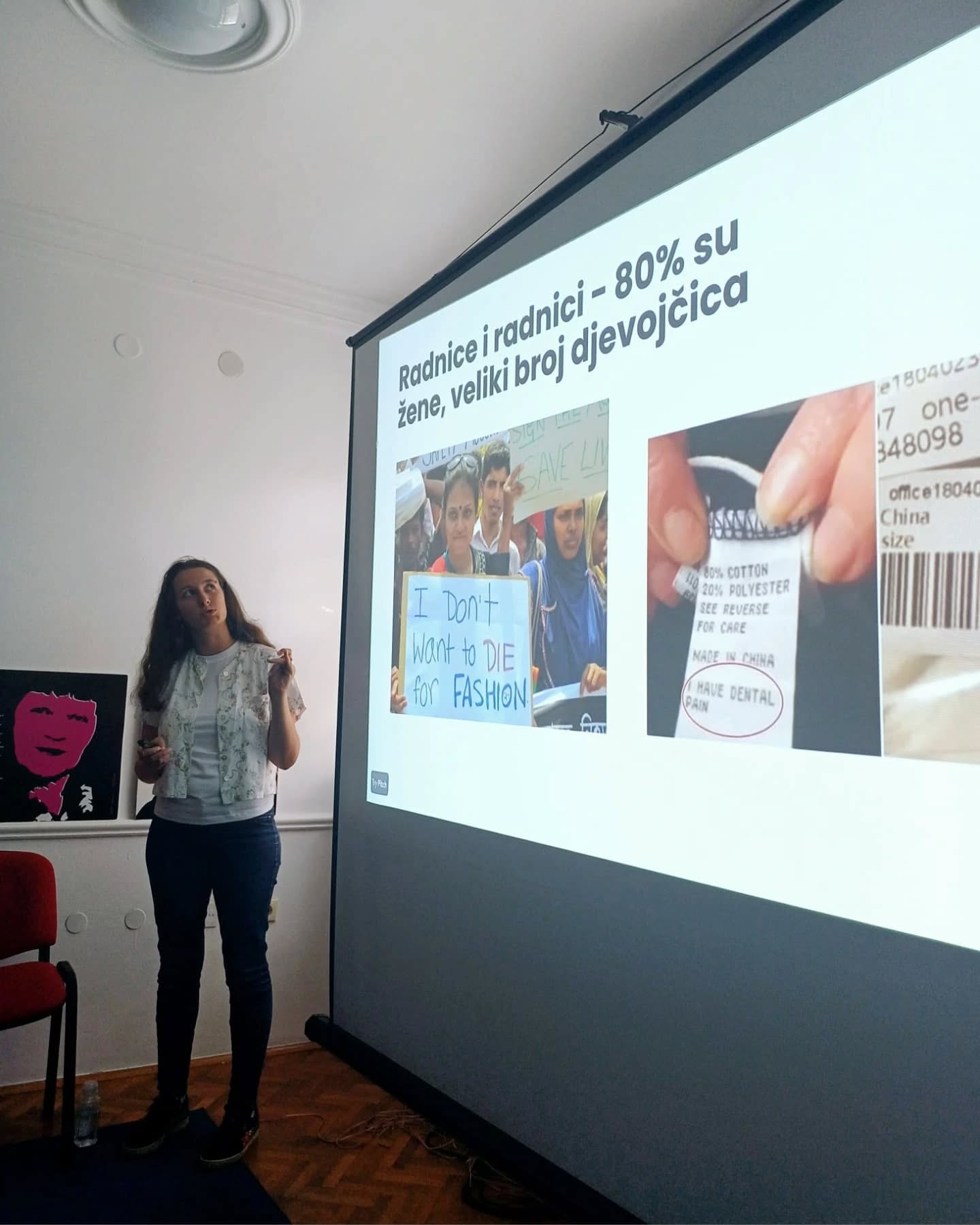The Helsinki Citizens’ Assembly Banja Luka has been using the Gender Barometer for four years, starting in 2020, as a special methodological tool for monitoring and assessing the gender sensitivity of political parties in Bosnia and Herzegovina. Our goal is to establish and substantiate with arguments how truly committed the key political parties in BiH are to work on the promotion of gender equality, especially bearing in mind that political parties are one of the most important elements of the democratic model of the organization of society, and that they have the obligation to support and protect democratic values and human rights, including women’s human rights, within their own organizations.
The fourth Gender Barometer, which results we present to you, brings more innovations – this time we have five parties who submitted answers to the questions from the Barometer; that is, one additional party which is more than usual average. Our Party, which until now was in the convincing first place in terms of gender sensitivity, has now “ceded” that place to the Social Democratic Party of BiH (SDP BiH), and the Serb Democratic Party, which has been participating in the Gender Barometer since 2021, has made the largest jump so far – from 4 points, which they had at the beginning, they “jumped” to 17 points.
As in previous years, questionnaires were sent to the addresses of the 10 largest political parties in Bosnia and Herzegovina, and answers were received from: Serb Democratic Party (SDS), Party of Democratic Progress (PDP), Democratic Front (DF), Social Democratic Party of BiH (SDP BiH) and Our Party.
Answers to the questionnaire were not submitted this year either by the largest parties that have been in power for years: the Party of Democratic Action (SDA), the Croatian Democratic Union of BiH (HDZ BiH) and the Alliance of Independent Social Democrats (SNSD), as well as the Union for a Better Future and the Democratic People’s Alliance (DNS). Failure to provide an answer implies that gender equality issues are irrelevant to these parties and that they do not take them seriously.
The received answers were scored according to already established criteria and then, based on the sum of the points, a ranking list of gender-sensitive parties was made. The higher this sum is, the more gender sensitive the party is.
Ranking list of gender sensitivity of political parties in BiH – 2024
| Party | Number of points |
| SDP BiH | 21 |
| Our Party | 20 |
| Democratic Front | 20 |
| SDS | 17 |
| PDP | 16 |
Ranking list of gender sensitivity of political parties in BiH; 2021, 2022, 2023 and 2024
| Party | Number of Points | |||
| 2021 | 2022 | 2023 | 2024 | |
| Our Party | 23 | 33 | 28 | 19 |
| SDP BiH | 15 | 17 | 20 | 21 |
| Democratic Front | 12 | – | 23 | 19 |
| SNSD | 11 | 10 | – | – |
| SDS | 4 | 7 | 12 | 17 |
| PDP | – | – | – | 16 |
When we talk about the gender sensitivity of domestic parties in 2024, compared to 2023, we see that the order of political parties has changed. The Social Democratic Party of BiH won the most points, followed by Our Party, Democratic Front, SDS and PDP. Compared to last year, SDS improved its work the most. The SDP BiH made slight progress, while Our Party and the Democratic Front mostly stagnated. We cannot compare PDP, since they answered the questionnaire for the first time this year. As we pointed out earlier, the largest jump was recorded by the SDS, which incorporated in its documents the legally prescribed quota of 40% of the members of the minority group, which must be in the executive bodies of the party. Other parties have done it before and did not continue to work on it. The largest decrease was observed in legislative activities that supposed to improve gender equality, which the parties explain by slow and complicated procedures. The parties expressed their willingness to work on improving the position of women and men by removing gender barriers.

- The gender profile of the party refers to the position of women within a party (presence in decision-making bodies and definition of their position in party documents).
- Initiatives and EU integration refer to the activities of political parties in proposing and passing laws and by-laws in entity and state parliaments and to activities leading to EU integration, with an emphasis on the gender component.
- Constitutional reform refers to the readiness of political parties to include gender components in the Constitution of BiH through changes.
The best-placed political party is the Social Democratic Party of BiH, which made the most progress in the gender profile segment of the party and where it did the most in comparison to other parties. Within the party documents, they very clearly and precisely defined many issues concerning gender balance. In the last year, they have not had any significant initiatives dealing with the gender component, but they are ready to support such initiatives and laws.
Second place is shared by the Democratic Front and Our Party.
The Democratic Front worked to improve the position of women in party bodies. As an opposition party in the Federation of BiH and at the state level, it was quite active in proposing laws and by-laws in both parliaments, with an expressed readiness to support all constitutional changes concerning gender equality. Our Party is one of the most gender-sensitive political parties in BiH, also in terms of the representation of women in decision-making bodies (there are 38.5% of women in the Presidency and 36% of women in the Main Committee of the party). In the past year, Our Party had one legislative initiative in the Parliament of the Federation of BiH, and other activities were aimed at the implementation of initiatives that were launched earlier. The willingness to implement the gender component in the Constitution of BiH is most present in Our Party.
In third place is the SDS, which recorded large jump compared to previous years, primarily in the domain of organization and functioning of the party based on the principles of gender equality, i.e. through the implementation of party documents that were previously adopted. What is characteristic for them, compared to other parties, is that they are in favor of introducing measures that will lead to full equality between women and men, not including other gender identities.
In fourth place is the PDP and we can say it still has a lot of room to improve the position of women within the party, but not in the activities in the legislative bodies where they have their representatives. This party was very active in criticizing the change in the Criminal Code regarding femicide, which was withdrawn from the procedure, but is one of the few parties that spoke about it.
In the previous four years of the research process and use of the Gender Barometer, we came to the following findings:
– That the majority of the ruling parties in our country (or parties that significantly participate in the legislature) have an ignorant attitude, i.e. they are absolutely uninterested in presenting data on how many women they have in party bodies or how active they are in the field of legally improving the position of women in society. In addition to the fact that some parties never answered the questions from the questionnaire, most of them are late in sending their answers. The exception is the Serb Democratic Party, which in the first three years of the research (2021-2023) was the only one that submitted answers before the deadline and was willing to additionally answer some questions or explain certain doubts.
– The parties generally show complete disinterest in the form of the following answers: “The election campaign is about to start, so we will not be able to respond.”, “If we are interested, we will contact you, you do not have to call us anymore”, “I do not know if we have time for this”, etc. The questions that were asked were neither difficult nor demanding; you could even say that it was something that anyone could immediately answer accurately. And we asked them about the number or percentage of women in management bodies, as well as about initiatives or laws that they proposed in parliaments, which were on the path of improving gender equality.
– All parties immediately forwarded the questions in Barometer to their party’s women’s clubs, thus confirming patriarchal patterns according to which issues concerning women are only a “women’s matter” and not their male counterparts.
– There were individuals from the parties who wanted to help, but who were waiting for certain information or permission from the party to participate in the research. All this waiting ended in a way that we never received the answers to the questionnaire. This is an indication that there is a clear hierarchy in the parties and that it must not be questioned.
– Some of the answers we received orally indicated that “many of the women in the parties generally still rely on their male colleagues in politics and prefer to accept the obligations of side jobs or humanitarian work, instead of more active participation in politics and initiation of political changes”.





